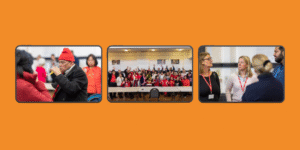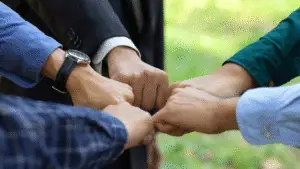
Invitation: Annual Graduation Ceremony
Are you a potential sponsor or partner looking to discover more about our programme? Join us for our annual graduation in July!

The Essential Digital Skills Framework from the Department for Education informs the Community Clicks curriculum.
Using a series of ‘I can’ statements, the framework combines digital foundation skills and five further areas of: communicating, handling information and content, transacting, problem solving, and being safe and legal online that deliver digital skills for life.
These underpin all essential digital skills, and state:
I can:
The skills required to communicate, collaborate, and share information, building on the digital foundation skills.
I can:
The skills required to find, manage and store digital information and content securely.
I can:
The skills required to register and apply for services, buy and sell goods and services, and administer and manage transactions online.
I can:
The skills required to find solutions to problems using digital tools and online services.
I can:
The skills required to stay safe, legal and confident online.
I can:
Community Clicks also extends each life skill into employment through an extended series of ‘I can’ statements based on skills for work, such as:
I can
Turn ‘I can’ into ‘we can’, and put the ‘S’ in your CSR and ESG goals by sponsoring one of our programmes and committing to a more digitally inclusive and equitable society.


Are you a potential sponsor or partner looking to discover more about our programme? Join us for our annual graduation in July!

Section 106 of the Town and Country Planning Act 1990 is a crucial legal framework that ensures new developments contribute positively to local communities.

A digitally inclusive society aligns directly with B Corp values by addressing inequality, fostering economic participation, and improving wellbeing.

Digital exclusion affects millions of older adults in the UK. 1 in 3 over-65s lack basic digital skills. This digital divide limits access to healthcare, financial services, social participation, and day-to-day tasks.

We connect local action to national and global goals, building digital equity and stronger, more inclusive communities.

Businesses that prioritise meaningful social initiatives don’t just do good, they do well. The ‘S’ in CSR and ESG is often the hardest to define and measure.